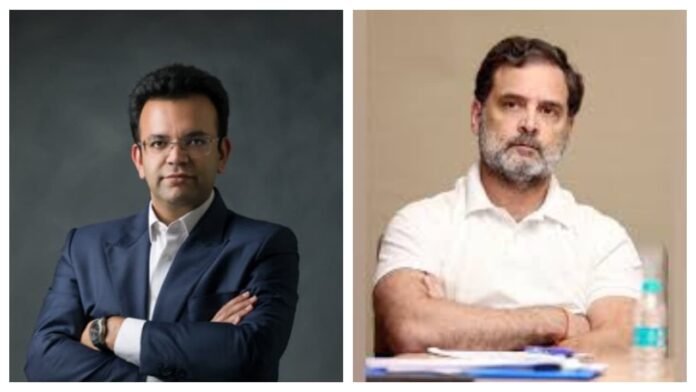‘He Was Just Like That’: Rohan Jaitley Breaks Silence on Rahul Gandhi’s Comment
Indian politics is no stranger to sharp exchanges and deeply personal remarks, especially between rival parties like the Bharatiya Janata Party (BJP) and the Indian National Congress. In a political landscape often defined by fiery rhetoric, one recent comment stood out—not because of its hostility, but because of the quiet, dignified response it evoked.
This article delves into the unfolding of events that led to Rohan Jaitley, the son of late BJP stalwart Arun Jaitley, responding to a comment made by Rahul Gandhi. The incident, laden with political undercurrents and personal emotion, offers a rare insight into how the legacies of prominent political figures are interpreted—and defended—in contemporary India.
The Context: Rahul Gandhi’s Remark
During a recent speech while addressing party workers in Delhi, Congress leader Rahul Gandhi made an offhand remark referencing several BJP leaders, including the late Arun Jaitley, former Union Finance Minister. While the precise words varied slightly depending on the media coverage, the essence of Gandhi’s statement was that the BJP and its ideologues lacked empathy or connection with the poor and downtrodden.
In that context, Gandhi allegedly included Jaitley among those “elite” leaders who, despite their articulate rhetoric, failed to truly understand or represent India’s marginalized. The remark was not scathing in tone but implied a broader criticism of the BJP’s leadership style and socio-economic outlook.
The Legacy of Arun Jaitley
To understand why Rohan Jaitley felt the need to respond, it’s crucial to look at who Arun Jaitley was.
A seasoned politician, skilled lawyer, and master strategist, Arun Jaitley was one of the most respected figures in the BJP until his untimely demise in 2019. He held key portfolios including Finance, Corporate Affairs, and Defence, and was instrumental in formulating landmark economic reforms such as GST implementation and Insolvency and Bankruptcy Code. Beyond policy, he was the party’s key troubleshooter and a bridge between ideological rigidity and modern governance.
Even political opponents, including Congress leaders, often acknowledged Jaitley’s intellect, debating skill, and personal grace. His death was widely mourned across the spectrum.
Rohan Jaitley’s Reaction
In a rare public statement, Rohan Jaitley chose to address Rahul Gandhi’s comment. Instead of an angry or defensive reaction, his response was reflective and personal.
“That was simply who he was…”
Rohan’s statement began with the words, “That was simply who he was…”, signifying a calm but heartfelt remembrance of his father. He emphasized that Arun Jaitley’s values were rooted in humility, discipline, and a commitment to public service.
“My father didn’t need to flaunt empathy; he lived it quietly. He wasn’t loud about his contributions because that was not his style. Whether it was helping a struggling lawyer at the bar or guiding a junior party worker, he was always accessible.”
These words weren’t just a son’s tribute—they were a defense of a legacy. In choosing to “break his silence”, Rohan signaled that while political criticism is part of democracy, dragging deceased leaders into it unfairly deserves to be countered.
Politics and the Personal: A Dangerous Mix?
Rohan Jaitley’s response reopens the age-old question in Indian politics: How fair is it to critique dead leaders?
In public discourse, especially during election seasons, leaders often invoke legacies—both positive and negative. From Jawaharlal Nehru’s economic decisions to Indira Gandhi’s Emergency, from Atal Bihari Vajpayee’s statesmanship to Rajiv Gandhi’s role in 1984 riots, political parties continuously reinterpret history.
But when it comes to personal values, especially of those who can no longer defend themselves, it becomes a delicate matter. Rohan’s measured tone is perhaps a reminder that political commentary must retain a human decency, even amidst ideological conflict.
The Media’s Role: Amplification or Misrepresentation?
It’s also important to analyze how the media treated the exchange.
Certain sections of the press projected Rahul Gandhi’s remarks as a direct attack on Arun Jaitley’s character. Others suggested that his comment was more of a generalized critique of BJP leadership and not targeted personally.
However, in the age of clickbait headlines and social media virality, such nuances are often lost. The resulting coverage triggered a sharp response from BJP leaders and supporters, many of whom took to X (formerly Twitter) to defend Jaitley’s memory.
Some pointed out that Gandhi, known for his spontaneity and off-script comments, should be more careful when speaking about departed leaders who served the nation.
Rohan Jaitley: Public Persona and Political Future
Rohan Jaitley is not just the son of a former Union Minister. He is a lawyer, the President of the Delhi and District Cricket Association (DDCA), and a respected name in the capital’s legal and sporting circles. Unlike many political scions, he has kept a relatively low political profile.
His decision to publicly respond to Rahul Gandhi could signal a potential entry or re-entry into political debates, especially at a time when the BJP is keen to nurture the next generation of leaders.
Interestingly, Rohan did not directly name Rahul Gandhi in his statement, keeping the focus on his father rather than making it a partisan issue.
Public Reaction: Respect Over Rhetoric
One of the striking aspects of this episode was how netizens, journalists, and political observers largely supported Rohan Jaitley’s dignified stand.
Many social media users praised his poise, contrasting it with the often bitter and accusatory tone of political discourse.
Some popular reactions included:
- “Rohan Jaitley just reminded us what it means to respond with class.”
- “Politics should learn from this young man—less noise, more substance.”
- “Arun Jaitley was respected across party lines. Let’s not dishonor his legacy for short-term political gains.”
Lessons for Indian Politics
This incident offers a few key takeaways for political observers and participants alike:
1. Legacy is Personal and Political
While politicians often become public property, their families and memories deserve respect. Political opponents should tread carefully, especially when referencing the deceased.
2. A New Kind of Political Communication
Rohan Jaitley’s statement reflects a new generation’s approach—less reactive, more composed, rooted in values rather than counterattacks.
3. Politics Needs More Empathy
If Rahul Gandhi was making a case for more empathy in politics, ironically, Rohan’s calm and introspective response served as a better example of that very value.
4. Media Literacy Matters
As consumers of political news, citizens must learn to look beyond sensational headlines and understand the context before forming opinions.
Arun Jaitley’s Broader Contributions
To truly grasp the weight of Rohan’s words, we must remember the legacy his father left behind:
- Economic Reforms: Spearheaded the GST regime, pushing India toward a unified tax system.
- Legal Reforms: Advocated for greater transparency and worked on several key amendments.
- Party Building: Helped the BJP build coalitions and shaped its urban, middle-class appeal.
- Mentorship: Guided several young leaders within the BJP and beyond.
He wasn’t just a minister; he was an institution within the BJP and Indian politics.
Will This Alter Political Discourse?
Probably not overnight. Indian politics thrives on aggressive posturing, polarizing speeches, and personalized attacks. However, moments like these act as moral speed breakers—brief but necessary reminders of a higher standard.
As India heads into future elections, there is a growing desire among voters, especially the youth, for civility in politics. They want to hear about policies, ideas, reforms—not personal jibes.
If leaders like Rohan Jaitley choose to engage more in public discourse, they may well set a precedent for more substantive and respectful dialogue in Indian politics.



